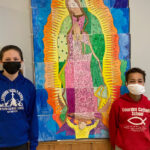
The COVID-19 pandemic continues to peel away our society’s “protective layers” to expose challenges and crises, the latest being the broad reach of hunger in America. Who would have thought that working families, including those making a living wage, would find themselves lining up outside a food pantry?
As Mike Miller of River Bend Foodbank observes in a story in this week’s issue, hunger is no longer a problem of the poor alone. “It is a middle-class problem.” His observation raises two important questions: How do we erase the stigma endured by all people who struggle to put food on the table, regardless of their personal situation? How do we eliminate the barriers that cause people to miss or skimp on meals to pay their bills?
Common Good Iowa released a “State of Working Iowa” report Sept. 2 that addressed the unprecedented public health crisis and the economic collapse resulting from it. The crisis “exposed glaring gaps and weaknesses in our public policies, and underscored systematic inequalities in economic and policy outcomes,” author Colin Gordon wrote.
While the report focuses on employment, it correlates with the observation of Iowa Food Bank Association’s executive director, Linda Gorkow, that working Iowans have remained unemployed or underemployed and the effects of that tend to snowball. “Families who have never had to ask for help have had to ask for help,” she said. Food is an expense. A cut to the budget means choosing between paying the rent and providing food on the table.
Gorkow pointed out that food insecurity in Iowa – the lack of consistent access to enough food for a healthy life — could increase from 9.7 percent of the population to 14.6 percent of the population (https://tinyurl.com/yy4p5fnv). As she firmly states, “It is not acceptable to have a hungry person in Iowa.” It is not acceptable to have a hungry person anywhere on this planet.
While September is Hunger Action Month, Christ’s mandate to feed the hungry and to come to the aid of our brothers and sisters requires year-round action and advocacy. Please engage in the following actions as your means, abilities and creativity permit:
*Learn more about hunger at the following websites: Feeding America (feedingamerica.org), Iowa Food Bank Association (iowafba.org), River Bend Foodbank (riverbendfoodbank.org). Each of those entities also depend on financial donations to provide sustenance to the hungry.
*Donate money to the food pantry or meal site(s) in your community, and/or the food bank in your region. Food Bank of Iowa (515-867-2880) and River Bend Foodbank (563-345-6490) serve many of the communities within the Diocese of Davenport boundaries.
* Don’t throw away food that could still be eaten by someone else.
*Share the Iowa Food Assistance hotline with someone who may need it (1-855-944-3663).
These recommendations in the State of Working Iowa report would go a long way toward alleviating and eventually ending hunger in our state and throughout the country:
*Extend and expand the CARES Act — reinstating the pandemic unemployment compensation bump in unemployment benefits, expand access to paid leave, and build in substantial assistance for state and local governments.
*Begin to address the policy gaps and weaknesses exposed by the pandemic itself. Gordon says “Our system of occupational health and safety is fundamentally flawed, a fact underscored by the rolling viral outbreaks at Iowa’s packing plants.”
*Modernize unemployment insurance to reach more of the workforce and respond in a crisis, and learn from the COVID-19 experience by adding paid family and medical leave, to benefit not only employees but employers as well.
Take action to stop global hunger
Catholic News Service reported in mid-July that nearly 690 million people went hungry in 2019, an increase of 10 million from the previous year, according to a United Nations report — before the emergence of the coronavirus pandemic.
While food insecurity has grown in the U.S., the hungry in other countries with a high number of vulnerable populations face an especially challenging situation. Some have no access to plumbing and utilities, let alone an adequate supply of food. That makes them more susceptible to COVID-19.
Ask Congress to provide $20 billion in funding for international poverty-reducing humanitarian and development assistance in the next COVID-19 supplemental package. This aid is crucial for the “more than 70% of countries the Centers for Disease Control and Prevention has described as ill-equipped to handle outbreaks of the illness caused by the novel coronavirus” (Catholic News Service, July 6).
Hunger is no longer a problem of the poor alone. It has become a middle-class problem because the pandemic exposed many flaws in our society. Please pray for all who are hungry and for a life-affirming solution to the coronavirus pandemic and the suffering exacerbated by it.
Barb Arland-Fye, Editor
(arland-fye@davenportdiocese.org)











